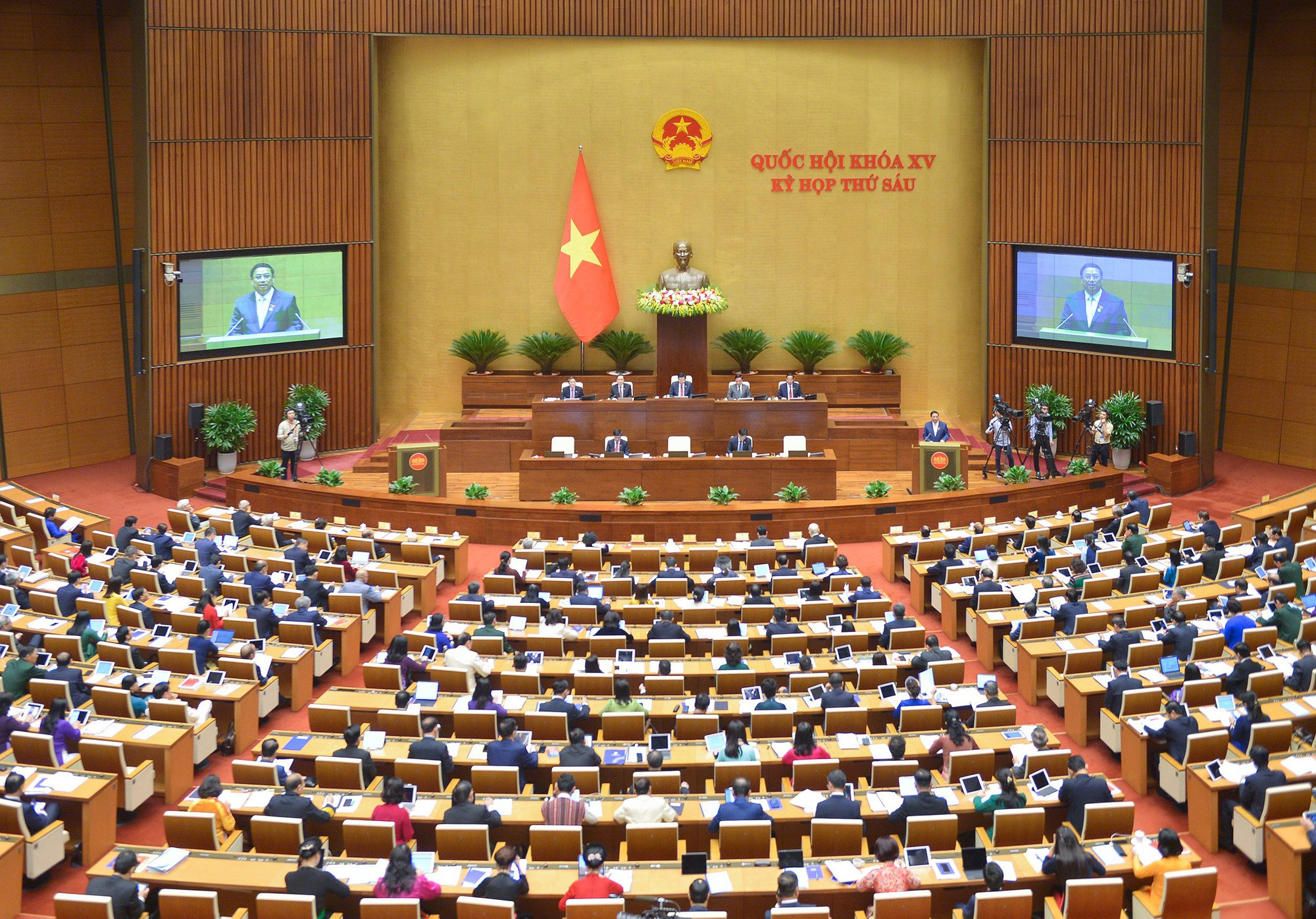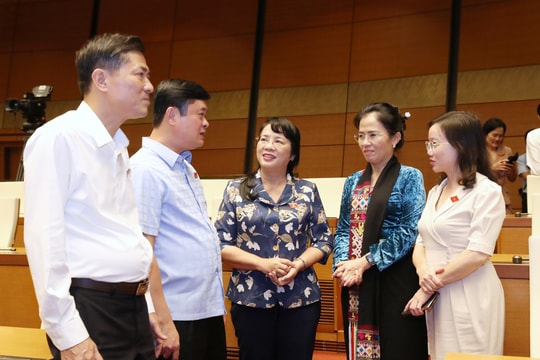If the quality of officials and civil servants is not evaluated based on salary, then salary increase is meaningless.
Implementing salary reform and paying wages according to work must be linked to streamlining the payroll and evaluating officials and civil servants. If the quality of officials and civil servants is not re-evaluated, then increasing salaries, even if small, is meaningless.

Low wages, not enough to live on, equal pay mechanism
Talking to the press about the issue of salary reform, Mr. Pham Minh Huan, former Deputy Minister of Labor, War Invalids and Social Affairs, said that this is the 5th salary reform, after 4 reforms in 1960, 1985, 1993 and 2003.
Looking at the current wage policy as a whole, it can be seen that the greatest success is contributing to stabilizing the macro economy, harmonizing the relationship between distribution and consumption, dividing the budget "pie" between development investment, debt repayment and reserves, not just for regular expenditure (including salary payment).
However, the current wage policy has limitations and shortcomings. First of all, it must be said that wages are low and do not guarantee basic living needs. The equal, average and unfair wage mechanism when good and bad performers are paid the same, leads to the elimination of labor motivation, Mr. Pham Minh Huan stated his opinion.
According to him, scientifically, the apparatus must be streamlined, but in reality it is still cumbersome, ineffective and inefficient. The rate of civil servants who cannot meet job requirements is still high. This is a major obstacle.
Besides, the salary system design is a bit complicated, only suitable for the period of 1993, but after several decades it becomes outdated.
On the other hand, the salary payment mechanism lacks evaluation linked to work results. Therefore, it leads to the phenomenon of "taking an umbrella in the morning and carrying it back in the evening", just "sitting still", unlike the market sector, where salary is based on work results. Therefore, when the market sector develops strongly, many talented people will leave the public sector.
Wage reform is "no way back"

Presenting his views on the roadmap for implementing salary reform from July 1, 2024 and paying salaries according to job positions, Mr. Pham Minh Huan highly appreciated the political determination of the Party and State on salary reform.
According to him, there is "no way back" in salary reform, we cannot prolong the current salary regime. That determination is first demonstrated by the allocation of funds for salary reform.
Mr. Huan said that in previous salary reforms, this was the most difficult issue. However, this time the Government has accumulated and saved a significant amount of resources to implement salary reform.
The specific content has been shown in Resolution No. 27-NQ/TW of 2018 of the 12th Central Executive Committee on reforming salary policy for cadres, civil servants, public employees, armed forces and employees in enterprises.
Salary reform from July 1, 2024 is appropriate
Mr. Pham Minh Huan believes that choosing July 1, 2024 as the date to implement salary reform is appropriate. From July 2024, salaries will be paid based on job positions instead of the previous fixed salary scale, which has many shortcomings.
For example, a state agency's staff is 200 this year and will increase to 20 next year, but the basis for the increase is absent or unclear.
According to Mr. Pham Minh Huan, paying salary based on job position must also come from the job before assigning people, not from people before assigning work.
It is necessary to re-determine how many departments there are in a ministry, how many jobs a department has, how many people a job requires, and then rearrange the personnel, cut down, and transfer them to the right job positions. This model works very well in many countries.
Evaluation of cadres and civil servants must be linked to salary
Therefore, it must be clearly defined that implementing salary payment based on job position is essentially streamlining the payroll, even attracting talented people into the system for change. Along with that, it is necessary to link salary payment with the mechanism of evaluating cadres and civil servants.
This is very difficult. A civil servant with a high basic salary who does not work well and has his salary reduced can easily lead to dissatisfaction and lawsuits. However, it is difficult but we must be determined to do it, we must build a method of evaluation and implement it.
Salary is just the beginning, later on salary is linked to work efficiency and level of contribution. Poor work must have salary reduced, good work must have salary increased.
According to Mr. Pham Minh Huan, currently, we mainly evaluate civil servants based on bonuses, but it is important that evaluation is linked to salary, only then will salary reform be in-depth and truly successful.
"If we cannot do this, we cannot retain good people, let alone attract talented people into the system," Mr. Pham Minh Huan emphasized.
If we cannot evaluate civil servants, salary increases are meaningless.
According to Mr. Pham Minh Huan, "Not to mention increasing salary sources, just streamlining the payroll, there are agencies that can streamline half of the payroll, just the money to pay salaries will double.
The head must be responsible for doing this and when streamlining, the salary fund for that agency must be kept the same to have motivation. If it is not possible to do everything at once, create a model from which to replicate.
According to Resolution No. 27-NQ/TW, the current basic salary and salary coefficient will be abolished, replaced by new salary tables that accurately reflect the actual capacity and ability to meet the work of civil servants and public employees...
The new salary policy will design a new salary structure including: basic salary (accounting for about 70% of the total salary fund) and allowances (accounting for about 30% of the total salary fund). Additional bonuses (bonus fund equals about 10% of the total salary fund of the year, excluding allowances). Thus, the administrative sector also has bonuses.
Mr. Pham Minh Huan said that there is another problem which is to expand the salary relationship, but how much? Currently, the lowest is the basic salary of the employee, gradually increasing to the highest salary of the General Secretary, President, Prime Minister, Chairman of the National Assembly...
This relationship has milestones, for example, the basic salary is 1, the salary coefficient of university graduates is 2.34 (coefficient multiplied by the current basic salary), the salary coefficient of Ministers and heads of ministerial-level agencies has 2 levels: 9.7 and 10.3.
"In 1993, when we were reforming salaries, the then Minister of Labor, War Invalids and Social Affairs, Tran Dinh Hoan, only wished that by the year 2000, the Minister's salary would be 1,000 USD per month. Until now, the Minister's salary is still far from 1,000 USD," Mr. Pham Minh Huan shared.
The problem is that if the highest salary does not increase, the people below will not increase either, and if they do not open up, they will close together. In a pyramid salary design, the highest salary person is not important because they are very few, but the middle salary person is important because they are the majority at the bottom.
A new graduate with a coefficient of 2.34 currently receives a salary of more than 4 million VND, while the average salary in the market is 7 million VND, which is only nearly half. Now how to increase it to 7 million?
Mr. Pham Minh Huan believes that being a civil servant does not make you rich, but you must ensure that you can live on your salary, at an average level, then the system will be clean. The salary management mechanism must be changed.
If the payroll system is good, we can put in the new salary system. If it is not good, it will not have much effect. If we do not re-evaluate the quality of civil servants, then salary increases, even if small, are meaningless.
The public sector must do it step by step, but the public sector must strongly change and classify, if qualified, gradually move to an autonomous mechanism. For doctors, let the patients pay, for teachers, let the students pay...
Paying the right salary is an investment in development.
Mr. Pham Minh Huan emphasized: Salaries must be designed so that those who are capable and have contributed a lot will quickly be promoted to higher salary levels and higher job positions. There is a design, but we have not been able to do it yet.
Currently, it is a sequential process, it takes time for a specialist to get closer and then become a senior specialist, there are even cases where a specialist does the work of a senior specialist, a senior specialist does the work of a senior specialist, and the senior specialist works less but gets the highest salary, not to mention there are cases where someone about to retire is promoted to a senior specialist but does not do the work of a senior specialist.
This design and organization must be changed, salaries must be paid to the right people, for the right jobs, and increases or decreases must be based on work results. Paying the right salary is an investment in development. Only when the economy develops can the budget "pie" grow larger. If the "pie" is not large, then salaries are like a blanket that is too narrow, one person is warm while another is cold.
Mr. Huan said, in the past, every time the salary increased, because of the tight budget, I witnessed the Ministry of Finance "complain": If the salary increases, other things must decrease. We used to calculate that for every 10,000 VND increase in the basic salary, the salary fund would increase by about 50,000 billion to 60,000 billion VND. That is a huge number that puts a lot of pressure on the national treasury. The salary resource is different from other policies, once it is put into the root, it must be built up the following year, this is not a simple problem.




